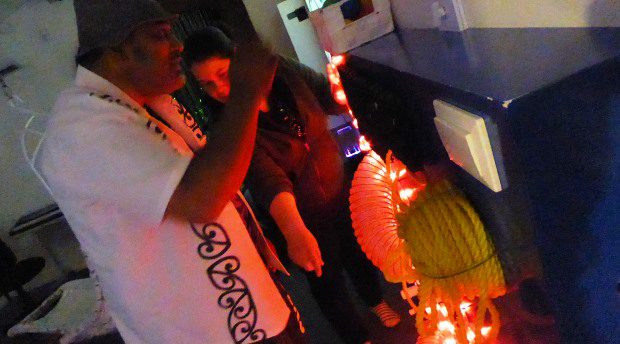
The work of two Dutch therapists almost 40 years ago continues to provide far-reaching benefits around the world.
Jan Hulsegge and Ad Verheul created multi-sensory environments, relaxing spaces designed to both reduce anxiety and stimulate reactions.
The environments are set up in “Snoezelen” rooms and one of only two in public use in New Zealand – Whare-O-Rongo – can be found in Hamilton’s Life Unlimited (now known as Your Way | Kia Roha) building.
Hulsegge and Verheul experimented with a sensory tent at the DeHartenburg Institute in the late 1970s with the aim of increasing enjoyment and sensory experience for those with intellectual disabilities.
Their one-weekend fair was so successful Snoezelen rooms can now be found in 40 countries.
Wendy van den Berg at Your Way | Kia Roha can testify to the benefits of the rooms. She has spent the last three years managing Whare-O-Rongo. She arrived at Your Way | Kia Roha with a background in mental health – and is the daughter of two psychiatric nurses and lived as a child across the road from the now closed Tokanui Psychiatric Hospital.
She deals each day with clients who have head injuries, sensory processing disorder or sensitivities, autism and intellectual difficulties.
“When we finish work at the end of the day, we enjoy a relaxation time – we arrive home, change into casual clothes, grab a cold drink and relax in front of the television,” she explained.
“Or it may be a bubble bath, soft music and candles – it is the same sensory modulation we attempt to replicate in our room.
“For many of the clients we deal with, sensitivities are so raised that even opening curtains in the morning can be intimidating – they don’t get to that point where they can simply relax. The Snoezelen room provides that opportunity where they can control and change the environment to suit their particular needs.”
Wendy says all people have strategies to relax or release pressure – ranging from chewing gum to fidgeting. The equivalent strategies used by her clients, though, were often more obvious.
They could include rocking, spinning, or touching people.
She says regular exposure to the Snoezelen room can and does enable clients to relax and explore their sensory environment, and in turn find more appropriate ways to remain relaxed or stimulated outside of the room.
“The two goals are relaxation and stimulation.”
Whare-O-Rongo in Hamilton has been in use for about 17 years and clients are exposed to soft music, colours and lights and invited to relax with various items or to challenge the senses.
It is also useful for support workers who can see what relaxes or stimulates their clients and even take ideas from it to use in the client’s own home and out into the community.
Your Way | Kia Roha subsidises the use of the room as part of its charitable trust status. People who work with people who will use the room must first meet Wendy. The room is available for public use at $7.50 an hour with bookings essential.
Just over a year ago, Your Way | Kia Roha added a multi-sensory garden next to the sensory room.
The Garden of senses allows people with disabilities to enjoy a wide range of experiences for therapy, learning, relaxation and fun.
Wendy says the room and now the garden helps many clients, and it is also a place of learning for her. She is working with one client who was initially completely uncomfortable in the environment and is now gradually increasing his time in there.
She sees a time ahead when he will be able to relax there and consequently become more relaxed out of the room.
“It can be hit and miss, but by concentrating on things he likes we are making progress.”
The word Snoezelen is derived from the Dutch verbs “snuffelen” (to seek and explore) and “doezelen” (to relax).
Who can benefit from use of the room and garden?
- Children who have significant special needs such as cerebral palsy, intellectual disability, multiple disability or autism.
- People who have had a brain injury
- Adults who have an intellectual disability
- People who have dementia and related disorders
- People who have chronic pain
- People who have mental health problems
- People who experience stress.
- Wendy van den Berg is a programme coordinator in the Your Way | Kia Roha Community Services team. She delivers the Life Friends programme and manages the multi-sensory environment room and garden.
Ends





